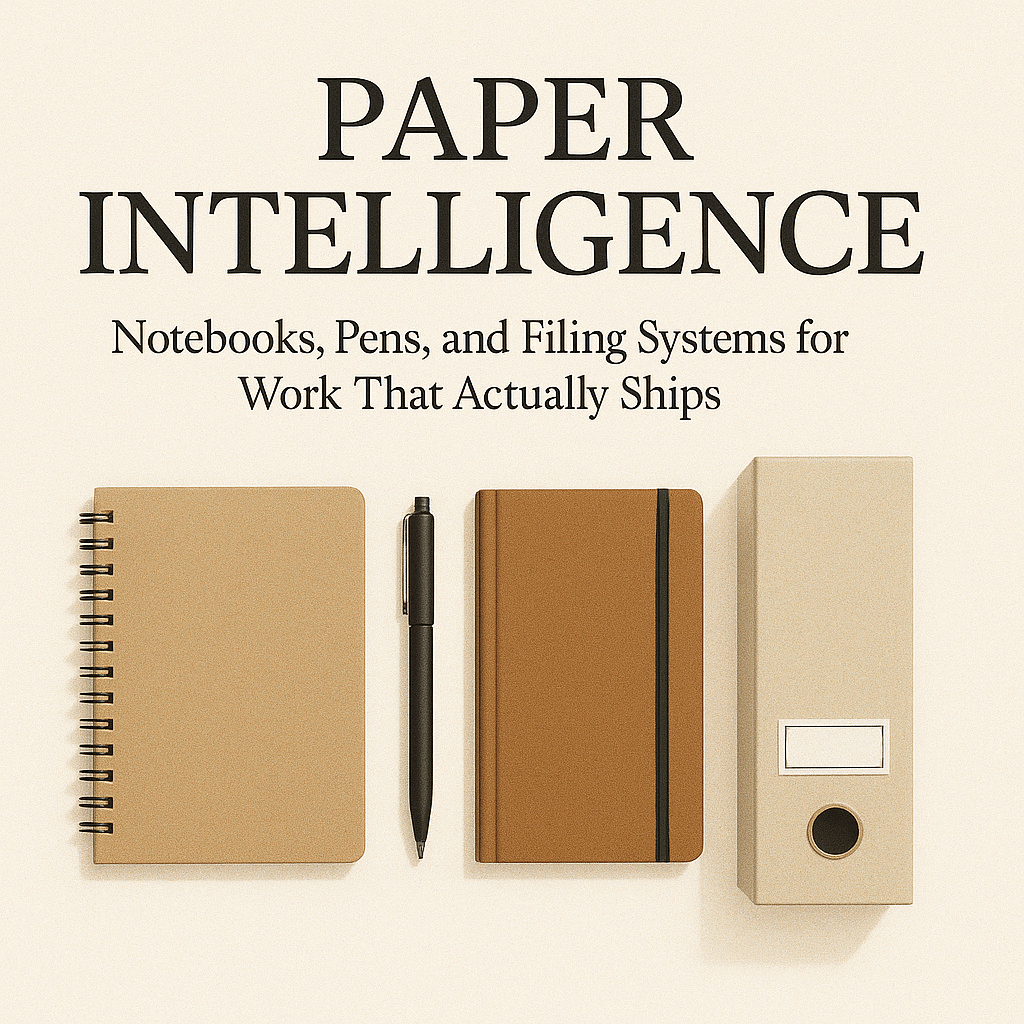
Paper Intelligence: Notebooks, Pens, and Filing Systems for Work That Actually Ships
Share
The digital world is swift; the analog world is wise. Paper slows the mind to the speed of comprehension; ink fixes intention into evidence. Here is an uncompromising manual for choosing paper tools that improve thinking rather than merely decorate it.
1) Notebook Taxonomy—Pick for Purpose
-
Project Notebook (A5, 90–100 gsm): One per initiative; index the first two pages; page numbers mandatory. Paper must accept gel and fountain ink without ghosting.
-
Daily Log (B5, 80–90 gsm): Date-stamped entries, Cornell margin for action items, perforated last 20 sheets for tear-offs.
-
Meeting Pad (A4, 100 gsm): Top-bound, stiffer backer, ruling subtle enough for sketching.
-
Pocket Capture (A6, 70–80 gsm): Gritty enough for pencil, stapled or thread-sewn—glued spines betray you.
2) The Science of Paper & Ink
-
Weight vs. behavior: Higher gsm reduces feathering but increases dry time—balance by choosing surface-sized stock.
-
Coating: Lightly coated papers flatter rollerball; uncoated with surface sizing flatter fountain nibs.
-
Archival: Acid-free, lignin-free, ISO 9706 if permanence matters. Store upright, humidity ~45–55%.
3) Writing Instruments: Function Over Fable
-
Gel (0.38–0.5 mm): Surgical line, instant legibility; choose replaceable cores.
-
Rollerball (0.5–0.7 mm): Fluid but prone to bleed; pair with heavier stock.
-
Ballpoint (0.7–1.0 mm): Long-form endurance; pressure-sensitive forms.
-
Fountain (EF–M): For drafts and letters; clean weekly, ink responsibly.
-
Pencil (HB–2B, mechanical 0.5/0.7 mm): For ideation and margin math; kneaded eraser prevents scarring.
4) Two Ruthless Note Systems
-
The Ledger Method (Daily Production):
-
Left margin for time; body for events/decisions; right margin for “@Next” actions.
-
Every page ends with a ledger line—a horizontal strike and a one-line summary.
-
Actions migrate to the task list at day’s close; pages never become to-do purgatory.
-
-
The Project Index (Long Work):
-
Reserve pages 1–2 as an index; each new entry earns a slug (“RPT-Budget v2”) and a page range.
-
When a project ends, export only the index + final ranges to the archive; the rest is compost.
-
5) Filing Without Shame
-
Three trays: IN / OUT / TO FILE. Nothing camps in IN overnight.
-
Color-coded hanging folders: Company, Project, Finance, Legal, Reference.
-
Quarterly archive ritual: Box completed projects; label spine with slug + quarter + keeper of record.
Desk Den Supplies Curations
-
Script A5 Project Notebook (96 sheets, numbered)
-
Ledger B5 Daily Book (Cornell margins)
-
Studio A4 Meeting Pad (stiff backer)
-
Vector Gel Pen Set (0.38/0.5 mm, refillable)
-
Architect Mechanical Pencil (0.5 mm, metal body)
-
Archive Hanging Folders + Spine Labels (assorted)
Paper is deliberate time: when the page fills, the task completes. Choose tools that reward attention with proof.
